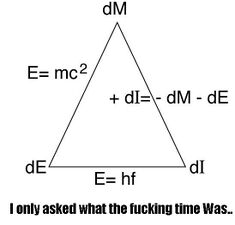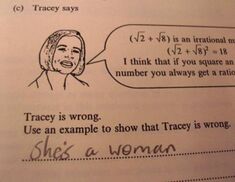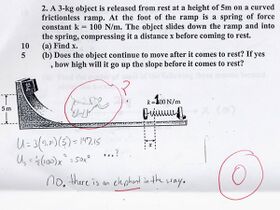Glossary of mathematical terms
(Redirected from Natural Number)
Jump to navigation
Jump to search
Mathematicians have an unfortunate tendency to take perfectly good English words and give them meanings that nature never intended. As such, mathematical texts are usually incomprehensible even before they get heavy into the Greek symbols. Thus, a glossary of mathematical terms for the layman:
a[edit]
- Abscissa: An oral abnormality one really ought to have looked at by a dentist.
- Absolute Value: The price of a bottle of vodka.
- Acute:
- Addition property: Second home. Obtainable with the job one hopes to get, provided one ever passes math.
- Algorithm (algore-ithm): A common operation in mathematical and scientific fields, an algorithm is performed by repeating a measurement or calculation over and over, until you finally get bored with the whole thing and call whatever intermediate result you may have found the correct answer, but watch out it killed Jeeves. Named after Al Gore, because he invented the Internet. See: Slim Shady Algorithm.
- Angle of depression: How far downward one's head falls after realizing one has failed math.
- Angle of elevation: The term to describe what is formed when one's head is tilted up to see over the inevitably large head of the person directly in front of him/her who is blocking the lecture notes.
- Argument: What many math students will take up with their teachers after receiving a low grade.
- Asymptote: Symptom of gambling, such as sweaty palms or empty pocket Fanny packs.
- Average Velocity: How fast one was going before being stopped by police. "I was just keeping up with the flow of traffic, officer, so I had to be going at an average velocity..."
- Axiom of Choice: For a given set of axioms, the one that is most preferred.
b[edit]
- Big-oh: Exclamation made by an algorithms student who finally "gets it or has come to term.
- Bipartite: Someone who swings both ways, politically.
- Bounded Interval: Distance one covers in the long jump.
c[edit]
- Calculator: Device used as an excuse for missing a problem.
- Cardioid: Heart condition brought on by excessive worry over impending math tests.
- Cartesian Coordinates: Coordinates that one thinks are correct, therefore they must be...
- Case:
- Unit in which one purchases one's carbonated and/or alcoholic beverage of choice, particularly when pulling all-nighters.
- Something of one's which everyone had better just get off of, right now, or else.
- Chinese Remainder Theorem: No matter what size order of Chinese food one gets, there is always just enough left over to have it cold for breakfast.
- Codomain: One of two domiciles.
- Compass: A tool most geometry students could use so they don't get lost from class to class.
- Complex number: Any number that requires more than ten fingers to count. Examples include thirtytwelve and a hundreteen.
- Conclusion: Something most math profs' lectures never come to. See also point.
- Constant Function: Something any device will be more than happy to do until the day after the warranty expires.
- Constant of Variation: Nothing endures but change...
- Continuous Extension: Something many students could use on assignment deadlines...
- Converse: A once-popular brand of sneaker that has undeservedly fallen out of favor.
- Coordinate Pair: Matching socks.
- Coordinate Plane: Job description for an air traffic controller.
- Coplanar: On the same flight.
- Coproduct: a 'duct' for coprological objects.
- Corollary: Pertaining to a decent small car from Toyota.
- Cosh: A largish club-like instrument of persuasive proof.
- Cosine: One's parent's sibling's child, unsuitable for marriage in 41 states.
- Critical Point: Depending on type of student, either the difference between a B and an A or the difference between a D and an F.
- Curve: Something one's math prof grades on, with any luck.
d[edit]
- A receipt for tuition, suitable for framing.
- Something one may not get if one fails math and/or has to take entirely too much math to obtain.
- Denominator: The Terminator's lesser-known superhero cousin. Unlike the name might suggest, it isn't the one who comes out on top.
- Derivative: Intelligent-sounding putdown of any artistic work one does not like.
- Determinant: Either stubborn or resolute, depending on whose side one takes.
- Digraph: Visual representation of an actuarial table.
- Directrix: Female director.
- Discrete Math: Hiding your mathematics textbooks so your roommates don't realize you're taking something so geeky.
- Discriminant: What one's professor obviously must have been, in order to give *you* such a low grade, which is clearly a matter that should be taken up with the dean...
- Disjunct: The vehicle in question is beyond repair.
- Distributive Property: Land bequeathed in a will.
- Division: A rare lifeform often kept as pets of scientists and mathematicians who can't seem to get enough of it. Divisions can get several generations old. The division needs to find another division in order to procreate itself. The two divisions will combine to a state of long-division which is when it is at its most vulnerable. The process can last up to several minutes. If it goes well several children will be born instantly known as remainders. Procreation often goes wrong where the offspring can be malformed into Infinity, Not a number or Low Battery. Divisions cease to exist when they try to procreate with zero
- Dot Product:
- A rejected top-level domain, no sillier than Dot Biz, Dot Museum, or Dot Aero.
- Anything ordered online.
- Dual Space: An alternative representation of an already well-understood mathematical space. At the turn of the 20th century, Mathematicians discovered it was possible to rewrite all of their results in a dual representation. In practice, this is accomplished by a simple exchange of horizontal and vertical notation. For example the dual of the vector is while the dual of the fraction is . There are several advantages of the dual space. For example, it is possible to obtain twice as much grant money by publishing some results before republishing them in their dual version.
e[edit]
- Eccentricity: Degree of insanity of a math prof. This is usually directly proportional to number of years teaching.
- Encryption: Step following mummification.
- Equally-Likely Outcome: What many students count on in true-false tests...
- Equivalence Class: Women and Gender Studies 101.
- Euler's Formula: The squeaky wheel gets the grease.
- Exponential Decay: What happens to food left under the bed in the dorm.
- Extraneous Solution: Any answer that is not the solution to the problem one is currently working on - hey, it's got to be the answer to something!
- Extranus Solution: Someone with two assholes. I don't know what this has to do with math, though...
- Extrapolated: Euphemism for "I made these numbers up."
f[edit]
- Floor Function: Keeping one's feet off the dirt.
- Focus: Something many math students seem incapable of.
- Fraction: A bit of a whole number. It can be expressed as the quotient of two integers (m/n). This is called a repulsive fraction. A fraction greater than 1 can be expressed as a mixed number or, more excitingly, as an inappropriate fraction. If you want to be less vulgar about it, you can also express it in its boring form, which entails punching the sum into your calculator and writing down what you see on the screen. However, be warned: calculators are notoriously stupid and will give you a result like 0.333333333 without acknowledging that the threes in fact go on forever. If this happens, do not be fooled: be sure to write all the threes. Fractions are rational numbers and are not to be confused with those unpleasant surds, who are completely irrational. As for slovenly transcendental types like e, a good honest fraction will not be seen near them.[1]
- Fun: Something largely considered impossible in the world of mathematics, and also in the world's of quantum physics, human biology, social ecology and Jupiter.
- Function: Something impossible to do before 10 am. Also, a squiggly line on paper that mathematicians care far too much about
- Fuzzy Set: Flatware left unwashed too long.
g[edit]
- Gaussian elimination: The art of murder by means of a Gauss rifle.
- General Proof: The sort of proof given as an example in the text, which usually is of absolutely no use as a reference when solving the problems.
- Gold Box Conjecture: A guess at the contents of a wrapped present.
- Group : Other name that a Junior mathematician gives to his garage rock band, actually
h[edit]
- Half-Plane: this entry censored post 9/11
- Hamiltonian Path: Where one's $10 bill has been and is going. Usually involves Student Accounts or the Bookstore, since that's where all the rest of one's money is going anyway.
- Harmonic Number: Opus of a given musical work.
- Harmonic Series: Orchestra programs. Inevitably including Beethoven's 5th, the New World Symphony, the 1812 Overture, and/or another indistinguishable Haydn symphony, every stinking season, season after season after... ahem.
- Hexadecimal: A number system many students ought to end up with after spewing curses at their work all day long.
- Hexagon: What one says to remove a curse.
- Hilbert's Hotel: A mathematical paradox. Also where you put unexpected guests that show up for your graduation.
- Hyperbola: Exaggeration; i.e., students' descriptions of the difficulty of any given assignment (in either direction, depending on the student).
I[edit]
- Quantity floating around in a mathematician's daydream.
- Answer made up by a student when he or she does not know how to solve the problem.
- Increment: What goes in, as opposed to excrement, what comes out.
- In-degree: Degree one intends to get, upon matriculation. See "out-degree".
- Indeterminate Form: Written in such a manner that a grader cannot determine exactly what the answer is supposed to be (particularly on true-false questions), in hopes that this person has never actually done such a thing and will not recognize one of the oldest tricks in the book.
- Indirect Proof: A proof that attempts to establish some mathematical truth by asserting that you are a big liar and that you said something that has as much relationship to the desired answer as that Chinese butterfly has to the stock market. See "Proof by Exhaustion".
- Infinite Series:
- See Robert Jordan.
- A horrible sitcom which will never be canceled, even though your own favorite show got the axe in its second season.
- Infinity :A big fuckin' number
- Integrals: Guys into girls.
- Inverse: Said poetically.
- Irrational number: Adjective describing any statement made by the typical math student - or teacher, depending on whose side of the argument one takes...
j[edit]
- Joint Variation: Plastic surgery.
k[edit]
- Kilo: The end result of coitus interruptus
l[edit]
- Large Sieve: A method for producing cheesecake.
- Law of Sines: You must come to a full and complete stop; "I totally paused" just isn't going to cut it.
- Lemma: Spiritual chant one may repeat obsessively in hopes of passing one's math exam...
- Line: Something one may never encounter when registering for a mathematics class.
- Line of Best Fit: Where one waits to use the dressing room in a department store.
- Linear: Straighter than a homo.
- Line of Reflection: What one waits in to use the mirror in a public restroom.
- Logarithm: See "Music for Pieces of Wood", by Steve Reich.
- Lower Bound: Wearing excessively tight pants.
m[edit]
- Margin: A unit of measurement.
- Matrix: A special case, in that it is one of the very few Keanu Reeves movies in which he does not suck.
- Mean Value Theorem: Any student, having been corrected after answering a question unsuccessfully, will respond afterward with "yeah, that's what I mean", regardless of whether or not said student had anything vaguely resembling that idea in mind beforehand.
- Median: Something to try to avoid when driving.
- Modulus: An outdated piece of descriptive slang. "Did you see her skirt?" "Yeah, it's modulus."
- Moebius strip: The counterexample for all those people who say, "No matter how thin you slice it, there are always two sides."
- Multiplication: Getting bigger.
n[edit]
- Natural Number: An intuitive answer to a problem. Which, if the problem is actually being asked, is probably incorrect.
- Nonagon: Everyone's here.
- Number line: Something waited in at a busy store ("take a number, please").
- Number Theory:
- An attempted explanation for one's mathematical reasoning.
- Any sort of mystical significance built up around certain numbers (for example, 666, 42, or 23) which usually establishes only that those who obsess over it have too much free time.
o[edit]
- Obtuse: A geometry student who doesn't "get it."
- Operation: Something one has to have on the day of one's most important exam, really, it's important and that was the only day I could get it done...
- Order: Thing that took so long to get at one's breakfast destination of choice, which explains the tardiness to class.
- Ordered Pair: Custom pants/shoes.
- Ordinal: Commonplace.
- Orientation: A deliberately incomplete introduction to college life which leaves out all the unpleasant bits one will not realize until the withdrawal date has passed.
- Oriented Surface: Something with Far Eastern decor.
- Origin: Scientists, theologians, and philosophers have been battling this one out for ages and you expect it to be settled here?
- Out-degree: Degree one actually ends up with upon graduation. In rare cases, may actually be what one originally intended to get.
p[edit]
- Palindrome: Another of those humongous sports arenas, sponsored by a vice presidential candidate.
- Parabola: A short story illustrating a principle or moral point.
- Permutation: an often regrettable hairstyle.
- Plane: A rapid airborne vehicle for long-distance travel. Often replicated in thin sheets of wood pulp by bored math students.
- Point: Something most professors' lectures have ... somewhere. The most important ones, of course, are always in the bits of the lecture that had to be crammed hastily into the last three minutes of class.
- Point of Tangency: The inevitable place in any lecture where the professor starts getting off the subject. Not that this is always (or even often) a bad thing.
- Polar Coordinates:
- The exact latitude and longitude of a given location in Poland.
- Directions to the North or South Pole.
- Polish Notation: Writing down an ethnic joke.
- Power Series: Chain of command.
- Prefix: Something you shouldn't do if it ain't broke.
- Property of 5 - A now defunct mathematical theorem that the number 5 is actually made up of several small parts (known as candelabras).
- Proof:
- It was in the pudding. And *then* the dog ate it.
- It's in the alcohol. See Absolute Value.
- Proof by Cases: Figuring that if one gets exceptionally drunk, one's solutions will make more sense.
- Proof by Contradiction: Including a step that doesn't hold up logically but would be awfully convenient, and hoping the grader will be too inattentive to notice.
- Proof by Exhaustion: A method of proof attempted at 3:00 am the day a problem set is due, which generally seems to produce far better results at that time than when looked at in the light of day.
- Proof by Malediction: A method used by mathematicians that makes sense only when using a large amount of crack.
- Pseudoprime: Any rather large number one cannot easily factor and thus "looks prime".
q[edit]
- Quadratic Residue: That stuff that accumulates on shower tiles, particularly when one's self and suitemates cannot agree whose turn it is to clean the bathroom.
r[edit]
- Ray: A drop of golden sun... Mi: a name... hey, why isn't anyone else singing? Well how about this song, Georgia...
- Reciprocal: The opposite of any given number, if it were to become bipolar.
- Recursive Algorithm: An algorithm which causes one to use profanity again. (And again, and again...)
- Relation: Person sharing one's genetic material—whether willing to admit it or not.
- Relatively Prime: Not having as many divisors. (Compared to 48, 51 is relatively prime.)
- Reflection: Something students claim to be engaged in if caught letting their attention wander during math class.
- Residual: The extra terms or factors that remain in the proof no matter what you do to get rid of them.
- Reverse Polish Notation: Transposing the words of some foreign expression or name that one cannot really remember, when writing.
- Russian Inversion Notation: In Soviet Russia, six times eight equals YOU!
s[edit]
- Shortest Path: Probably the quickest way to get somewhere. However, the time saved by following this path is countered by the time wasted by arguing over which path this is.
- Sieve of Eratosthenes: A mathematical tool not dissimilar to a colander, used to determine whether a number is prime or not.
- Sine: Something you read, and which doesn't exist when speeding
- Slide rule: A tool that claims to be useful for mathematical purposes, but is, in fact, just an elaborate prank.
- Statistics: What you use when you can't think of any good lies or damn lies.
- Step Function: A function of one's parent's second spouse.
- Substitution: Replacing one's instructor with an equally inefficient model.
- System of Inequalities: Affirmative action.
t[edit]
- Tangent: One of those weird hybrid citrus fruits.
- Taylor Series: What is used when you can't get the clothes to fit right
- Telescoping Series: Nova, Cosmos, or one of those community college astronomy telecourses.
- Torus: A mid-size car from Faurd.
- Tractrix: Jane Deere?
- Trichotomy: An axiom which determines if something is true, that same something is false or, the two somethings are the same.
- Trivial: Having to do with obscure and irrelevant pieces of knowledge; i.e., the sort of items students will bring up in class when they want the professor to get off the subject.
- Truncation error: Cutting something off befor
u[edit]
- Upper Bound: Corset.

Because of their shadowy and secretive nature, variables are also called unknowns or ninja symbols. They are just as elusive and dangerous as real ninjas, and should be avoided at all costs by anybody not properly trained in their handling.
v[edit]
- Vacuous Proof: Proof given when one really has no clue whatsoever what one is talking about.
- Variable: A variable is anything that you don't know. It is the part of an equation that isn't really anything, but could be anything. I mean, it could stand for an integer, or a complex number, or a mammal, or a president, or a sitcom. It's a total mystery, and one of the great unsolved problems of Mathematics.
- Vector Space (or Linear Space): A set V such that every R in V has a little arrow above it.
{w…z}[edit]
- Well-Ordering Principle: A place for everything and everything in its place. You show me a student whose room is well-ordered and I'll show you someone with an important assignment to put off.
Footnotes
| |||||||||||||||||||||||||||||||||||||||||||||||||






